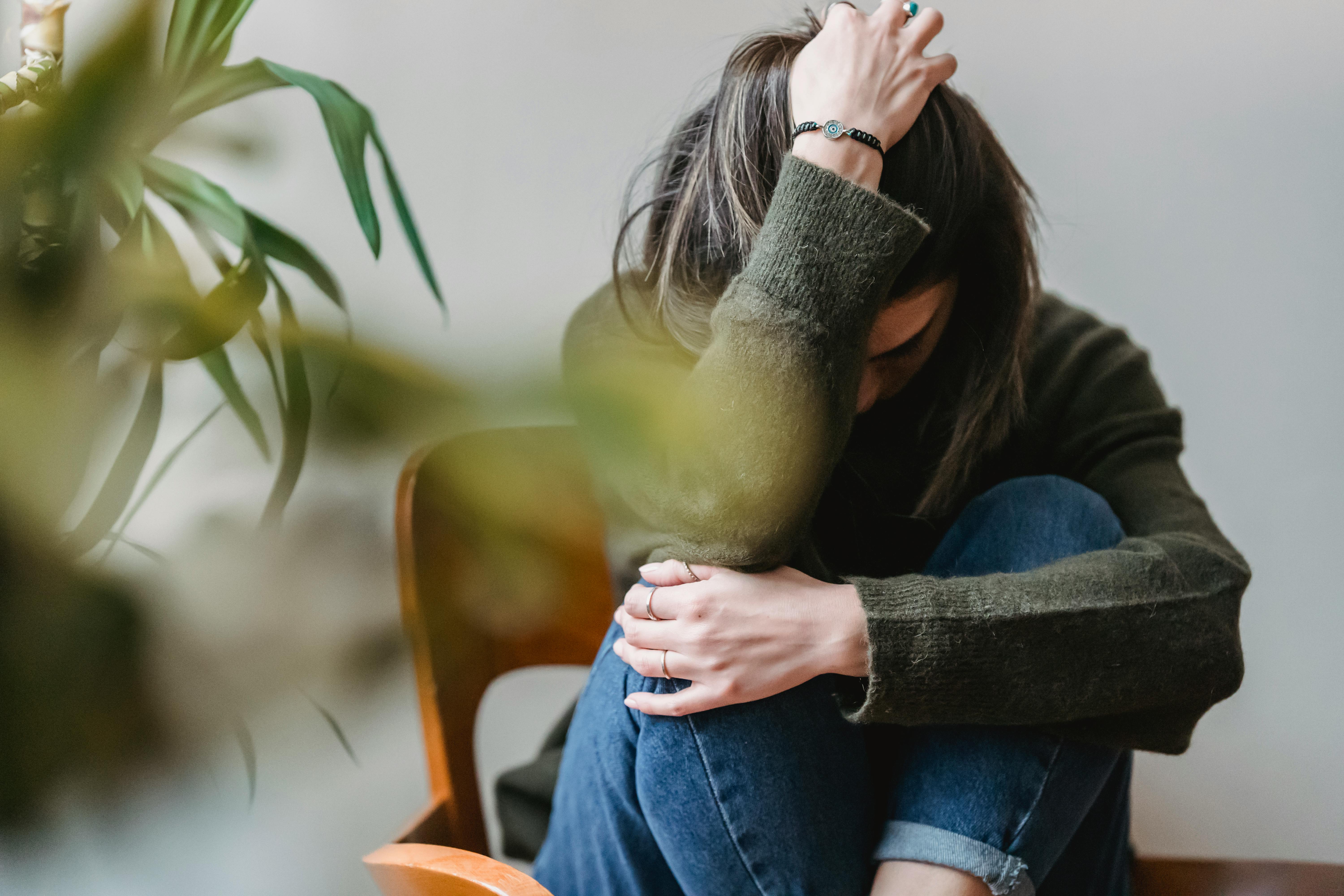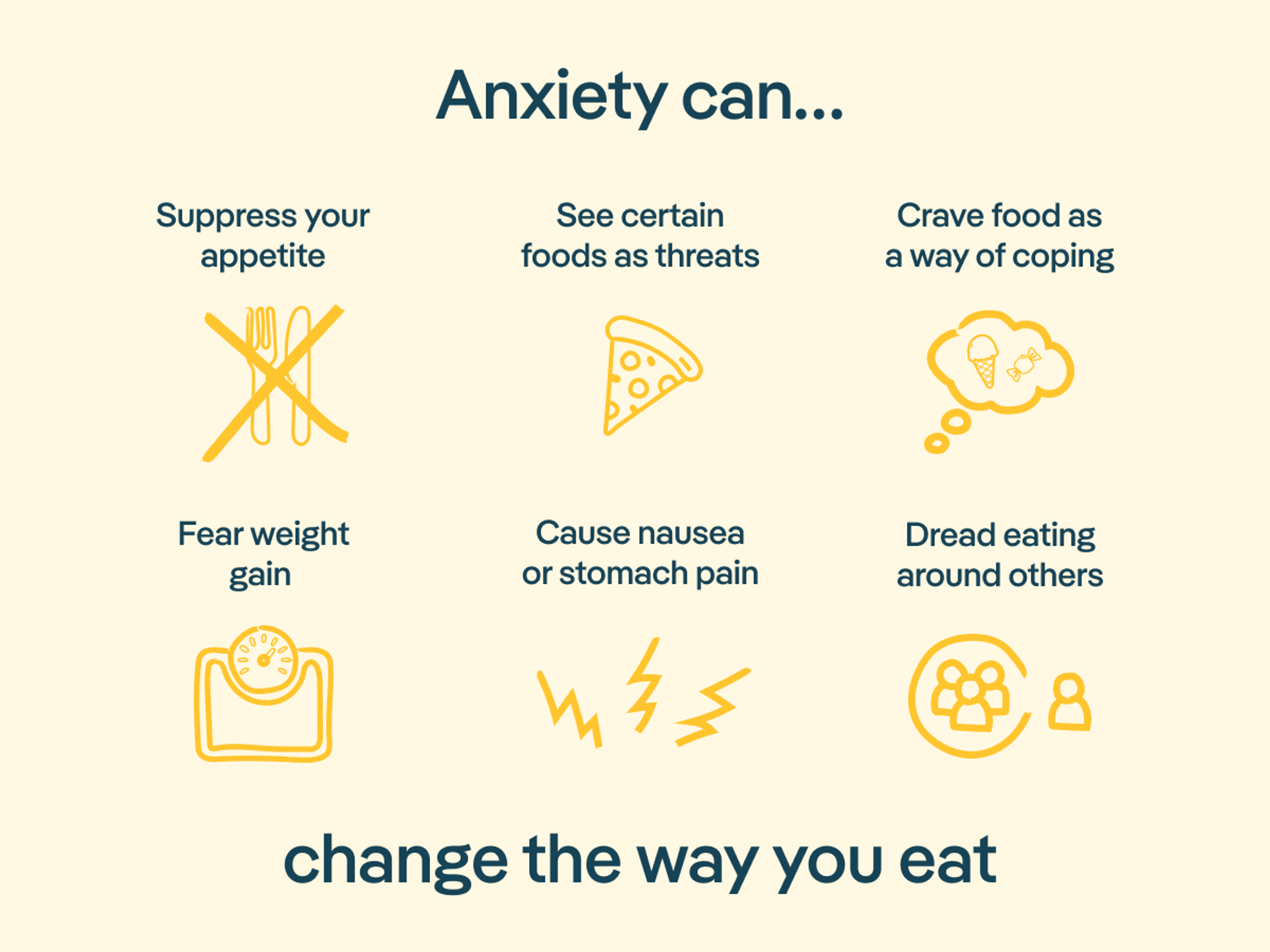


The first time I discovered I’d been diagnosed with anxiety was kind of by accident. I was submitting a superbill to my insurance company, hoping to receive modest reimbursement for the therapy sessions I’d been attending for my eating disorder. Filling out the mandatory paperwork, I quickly scanned my therapist’s document to determine my specific diagnosis, and there it was: not anorexia, but generalized anxiety disorder (GAD). I was shocked. Did I have both conditions? And what exactly is the connection between eating disorders and anxiety? Let’s get into it.
What does the research say about eating disorders and anxiety?
Anxiety, like eating disorders, comes in many forms. While everyone can feel anxious occasionally, those with anxiety disorders experience excessive and intense worry that impacts daily life. The symptoms can range from trouble concentrating and irritability to heart palpitations, sweating, sleep problems, and more. There are also several different kinds of anxiety disorders, including:
- Generalized anxiety disorder (GAD): characterized by excessive worry regarding daily activities or situations
- Panic disorder: characterized by recurrent panic attacks and the fear of experiencing them
- Social anxiety disorder: characterized by a heightened fear and worry that social situations may lead to humiliation or rejection
To say anxiety is common is a major understatement: according to the World Health Organization (WHO), about 4% of the global population currently experience an anxiety disorder. In 2019, 301 million people worldwide had an anxiety disorder, making them the most common of all mental disorders. Considering the frequency with which eating disorders co-occur with other conditions (including OCD, substance use disorder, and depression), it may come as no surprise that many people with eating disorders also grapple with anxiety.
According to Equip Therapist Lead Jonathan Levine, LCSW, current research indicates that there’s a high prevalence of anxiety in eating disorders, with the anxiety often (but not always) preceding the onset of the eating disorder and persisting after it’s in remission. Rates vary depending on which specific eating disorder someone is struggling with, but Levine says the connection between eating disorders and anxiety is clear. According to research, some 48% of adults with anorexia, 81% of adults with bulimia, and 65% of adults with binge eating disorder (BED) have at least one co-occurring anxiety disorder.

Does anxiety cause eating disorders—or vice versa?
There’s no single cause or explanation for why some people develop eating disorders, anxiety, or both, but there are certain risk factors.The development of both eating disorders and anxiety is influenced by a complex interaction of genes, biology, behavior, environment, and more.
“Researchers don’t know for sure whether anxiety causes eating disorders or vice versa, as it’s often a chicken-or-the-egg type of situation,” Levine says. “Like so much of mental health, it comes down to the person. Some people develop anxiety, whether it's related to performance, socialization, or generalized, and never experience an eating disorder. Others may develop restrictive eating and experience anxiety that’s below the clinical threshold, or in other words, their anxiety is not a major factor in their day-to-day life experience.”
While it’s often impossible to say which illness leads to the other, it’s important to note that starvation—an effect of the restriction that’s characteristic to many eating disorders—affects the brain and can lead to mood changes, rigid thinking, reduced appetite, and, yes, anxiety. “People who are malnourished often develop anxiety that dissipates as the brain becomes nourished via a routine pattern of eating,” says Levine.
“Another explanation resides in a behavioral pattern of avoidance, which is frequently seen in those struggling with eating disorders and anxiety,” says Levine. “This can be seen by some people avoiding eating in public, eating around others, or certain foods entirely. Avoidance is a hallmark of anxiety, in that people avoid the catalyst that causes anxiety, which makes them more hesitant to challenge this anxiety in the future, creating a perpetuating see-saw of increased anxiety.”
Social anxiety can also play a role, as people may feel a subconscious desire to use eating disorder behaviors as a way of minimizing their anxiety while around others. “This desire may lead to a hyperfocus on what they're eating—type of food, calories, when and where they eat—in response to the anxiety,” Levine says. “In this instance, social anxiety may lead to disordered eating which can then lead to a full onset of an eating disorder.”
While bulimia is the eating disorder most associated with anxiety, it’s not entirely clear why that’s the case. There are, however, multiple theories that Levine says he keeps in mind when discussing the issue with patients and families. “One piece to consider is personality characteristics. Neuroticism—which is characterized by worry, anxiety, and hyper sensitivity— has been found to increase the risk of binge eating, a key symptom of bulimia,” he says.
How eating disorder treatment addresses anxiety concurrently
Regardless of the reason why someone feels anxiety, Levine says how they react to their anxiety determines whether it will improve or worsen. “If we avoid what's causing our anxiety, be it eating, socializing, or anything else, that anxiety will increase because it hasn’t been challenged,” he says. “And the next time you’re faced with the same situation, that anxiety is still high because it was never dealt with—it continuously grows until you face it.”
With that in mind, it’s easier to understand why so many forms of eating disorder treatment are also proven to be effective methods for treating anxiety; in both instances, patients are supported in challenging the things causing them distress and developing healthy coping behaviors. One of the main strategies for treating both anxiety and eating disorders is psychotherapy, and most eating disorder therapists are trained to address common symptoms of both through evidence-based treatment.
“There are multiple treatment modalities that can treat both eating disorders and anxiety,” Levine says. “The modality that’s used will largely depend on someone's age and diagnoses, but some options include family-based treatment (FBT), dialectical behavioral therapy (DBT), exposure and response prevention (ERP), and enhanced cognitive behavioral therapy (CBT-E). These are all evidence-based, effective treatments for someone struggling with anxiety alongside an eating disorder.”
In my case, ongoing therapy has not only been critical in my eating disorder recovery and long-term healing, but in improving my anxiety as well. The tools I’ve learned in treatment to address my eating disorder have naturally helped with my anxiety, and vice versa. Eating disorders and anxiety often go hand in hand, which can feel overwhelming. But it’s important to remember that having more than one diagnosis doesn’t mean that recovery will take twice as long, or that you’ll always be dealing with at least one condition. With evidence-based treatment and comprehensive support, you can tackle both diagnoses at once, and let your recovery from one strengthen your recovery from the other.

- “Eating Disorders - Symptoms and Causes.” n.d. Mayo Clinic. https://www.mayoclinic.org/diseases-conditions/eating-disorders/symptoms-causes/syc-20353603#:~:text=Starvation%20affects%20the%20brain%20and.
- “Eating Disorders.” 2023. National Institute of Mental Health (NIMH). 2023. https://www.nimh.nih.gov/health/topics/eating-disorders#:~:text=Researchers%20are%20finding%20that%20eating.
- “International OCD Foundation | Exposure and Response Prevention (ERP).” n.d. International OCD Foundation. https://iocdf.org/about-ocd/treatment/erp/.
- María Pérez, Timothy Hayes, and Leslie D Frazier. 2023. “Beyond Generalized Anxiety: The Association of Anxiety Sensitivity with Disordered Eating.” Journal of Eating Disorders 11 (1). https://doi.org/10.1186/s40337-023-00890-0.
- World Health Organization. 2023. “Anxiety Disorders.” Www.who.int. World Health Organization. September 27, 2023. https://www.who.int/news-room/fact-sheets/detail/anxiety-disorders.







